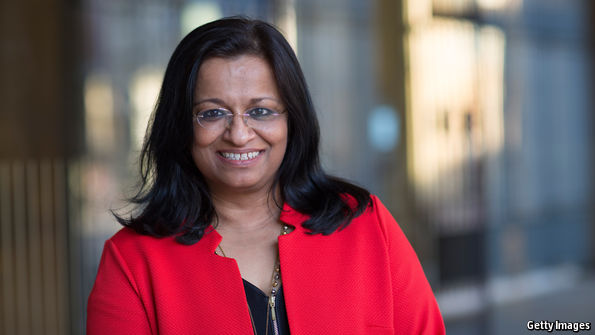Religion
Related: About this forumReligions must speak to the faithless, as well as to each other
Learning from a Christian-Muslim debate on religious literacy

Mar 3rd 2017
by ERASMUS
YOU may find this reassuring, or disturbing, or something in between. Earlier this week, one of the most eminent scholar-prelates in the Christian world, and one of Britain’s leading Muslim scholars, held a kind of public debate in London on the role of religion in society, and they agreed on almost everything. One participant was Rowan Williams, who until recently was Archbishop of Canterbury and head of the global Anglican Communion; the other (pictured) was Mona Siddiqui, a professor of religion at Edinburgh University and prolific writer on her faith.
They have known each other well since an exercise in high-level religious diplomacy that was launched with backing from Tony Blair, then Britain’s prime minister, soon after the terrorist attacks of 9/11. Then, prominent Christians and Muslims met behind closed doors and probed each others’ understanding of religious concepts like scripture, salvation and prophecy. The whole initiative, entitled Building Bridges, was a reflection of a hopeful spirit which pervaded the atmosphere after September 2001; if only Christians and Muslims knew each other better, all would be well. Such optimism is less common now but participants, who continued meeting for about a decade, insist that lasting good was achieved.
Some of the points of convergence in this week's debate were the ones you might anticipate. Both broadly agreed that “religious literacy” (in other words, basic knowledge about what people of faith do, believe and revere) was both in dangerous decline and yet more urgently needed than ever. Asked to imagine Western society in 30 years’ time, Lord Williams said he expected an ever-wider range of religions and other deeply held beliefs to be lived out with unfading passion. But unless something changed, these fired-up communities could be living in a state of deep ignorance of one another’s values and mental worlds. In other words, there would be a new kind of Babel where society’s internal communication barriers were insuperable.
Both speakers at the event organised this week by Ekklesia, a religious think-tank, saw an urgent need for more and better religious education; they are, after all, distinguished religious educators so that too might be expected. Lord Williams, who is now master of Magdalene College, Cambridge, wanted a more experiential kind of religious instruction: not just imparting facts about history and culture, but somehow conveying to people “what it feels like” to practise a particular kind of faith and worship.
http://www.economist.com/blogs/erasmus/2017/03/faith-dialogue-and-deafness
vlyons
(10,252 posts)the teachings of the HH the 14h Dahli Lama, who for decades has worked tirelessly on interfaith understanding and harmony.
https://berkleycenter.georgetown.edu/quotes/the-dalai-lama-on-interreligious-harmony
I always recommend his book, "Beyond Religion: Ethics for the Whole World" which his vision for secular ethics in a less religious, more secular and scientific world.
https://www.amazon.com/Beyond-Religion-Ethics-Whole-World/dp/054784428X
Thanks for the addition.
lunasun
(21,646 posts)inspired peace through no religion in the world. Look even in this posting headline what does it state ? In the heading there is separation between religion and what is called faithless declared
The world may move beyond religions to seek world peace IMO
vlyons
(10,252 posts)We humans do experience "spirituality," which I define as intense feelings of happiness and contentment when we feel connected to something larger than ourselves. Could be a high mass, or a rock n roll show, or a political rally. The desire for community is built into our DNA over millions of years of evolution.
I'm convinced that teaching ethics and instilling the importance of moral behavior is necessary before we can ever advance to higher more advanced religious studies. We start by teaching the Golden Rule. Everyone knows what that is. taught by every religion. In the secular world, we much teach that the Golden Rule is in everyone's self interest.
But, whether there is or not, there's no excuse for biting each other in the neck while we're waiting to find out.